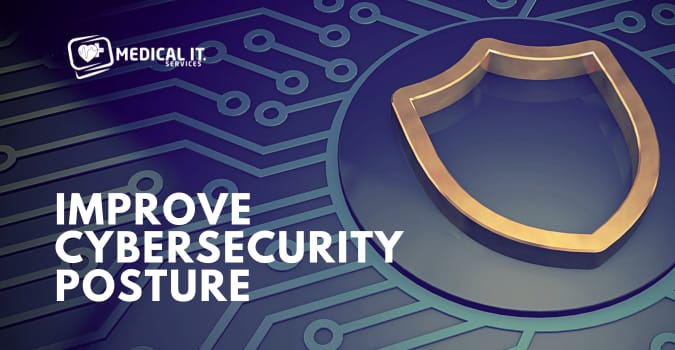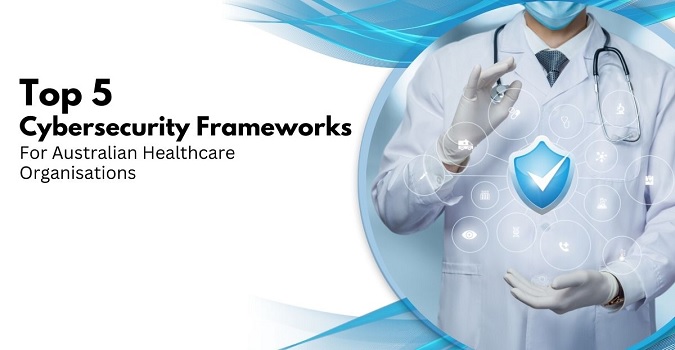October marks the celebration of Cyber Security Awareness Month (NCSAM), a time dedicated to promoting…

How Healthcare Organisations Improve Their Cybersecurity Posture?
The healthcare industry has witnessed a significant transformation that has revolutionized patient care and improved operational efficiency, but they have also exposed healthcare firms to a multitude of cybersecurity threats. Protecting sensitive patient data and ensuring the integrity of medical systems has become paramount. In this article, we will explore how healthcare organizations can improve their cybersecurity posture in response to modern security challenges.
What is Cybersecurity Posture?
Cybersecurity posture is the overall strength of an organization’s defense against cyberattacks. It encompasses the people, processes, and technologies that an organization has in place to protect its information assets from unauthorized access, use, disclosure, disruption, modification, or destruction.
Understanding the Threat Landscape
The healthcare sector, rich in sensitive data, faces heightened cyberattacks due to interconnectivity. Regular data backups, access controls, encryption, staff training, and security audits are imperative for robust cybersecurity, mitigating risks in this dynamic landscape.
Employee Training and Awareness:
Healthcare staff should be well-informed about the latest cybersecurity threats and best practices for identifying and responding to them. Regular training programs and simulated phishing exercises can help employees recognize potential threats and reduce the risk of falling victim to cyberattacks.
Strong Access Control Measures:
Healthcare organizations should implement robust authentication and authorization systems to ensure that only authorized personnel have access to patient information. Implementing multi-factor authentication and least privilege access principles can significantly reduce the risk of unauthorized access.
Data Encryption:
Data encryption is an essential component of healthcare cybersecurity. All patient data, both in transit and at rest, should be encrypted. Encryption ensures that even if a cybercriminal gains access to the data, it remains unintelligible without the decryption key.
Update Security Patches:
Outdated software and unpatched systems are prime targets for cyberattacks. Healthcare firms must establish a robust patch management process to ensure that all software and systems are kept up-to-date. This reduces the vulnerabilities that attackers can exploit.
Endpoint Security:
Securing endpoints such as desktops, laptops, and mobile devices is crucial. Implementing advanced endpoint security solutions can help defend against malware, ransomware, and other threats. Regularly scanning and monitoring endpoints for potential security breaches is essential.
Threat Detection and Response
Healthcare organizations should invest in advanced threat detection tools and establish an incident response plan. Rapid detection and containment of threats are critical to minimizing the damage caused by a cybersecurity incident.
Disaster Recovery and Backup
In the event of a cyberattack or data breach, having a robust disaster recovery and backup plan is essential. Regularly back up patient data and test the restoration process to ensure the ability to recover data in case of an emergency.
Regulatory Compliance
Compliance with healthcare-specific regulations, such as the Health Insurance Portability and Accountability Act (HIPAA), is non-negotiable. Whether you are a medical clinic, hospital, or private practitioner, you should ensure that your cybersecurity policies and procedures are aligned with the HIPAA regulations to avoid legal repercussions and protect patient privacy.
Summary
In conclusion, healthcare organizations need to bolster their cybersecurity posture to protect patient data, ensure the integrity of medical systems, and maintain their reputation in the face of evolving cyber threats. Following the above-mentioned comprehensive guidelines, including employee training, advanced technologies, and proactive response plans, healthcare firms can safeguard both patients and data in the digital age. Cybersecurity is not merely a compliance obligation but a fundamental aspect of providing quality healthcare and building patient trust.
Strengthening Cybersecurity Posture
This is a very crucial part for healthcare organizations to protect sensitive patient data and improve cybersecurity posture to build and maintain trust in the industry. By partnering with MedicalIT.Services, and healthcare firms can create a secure environment that protects sensitive patient data from cyber threats. We provide AI-Based Healthcare Cybersecurity Solutions with Risk Assessment Features to solidify your network security. Contact us at 03 80808014 to learn more about cybersecurity and threat management.



